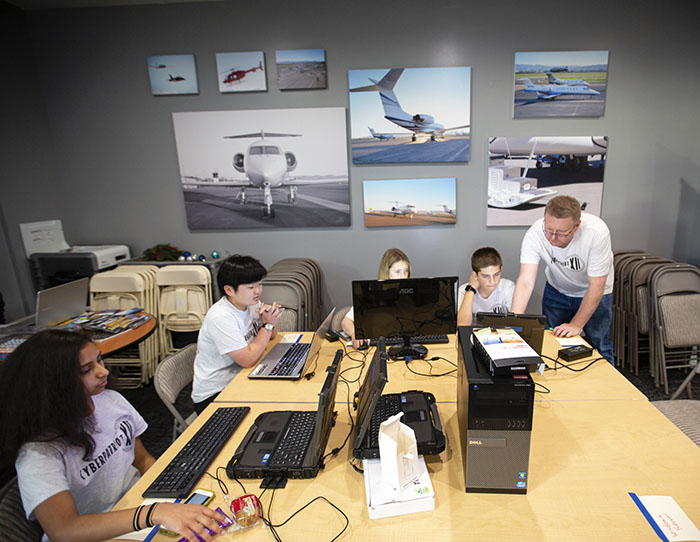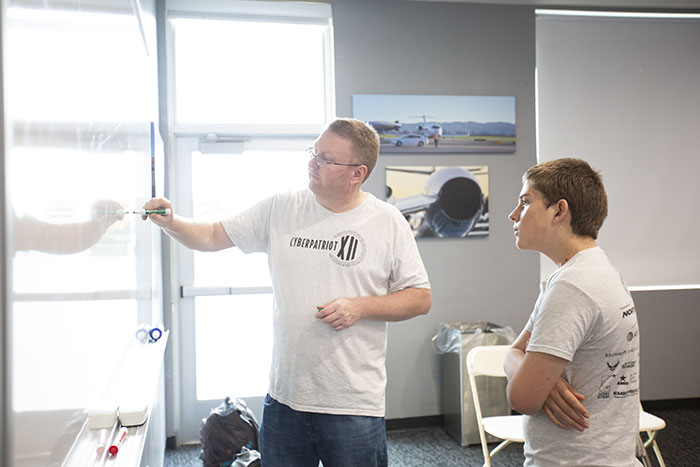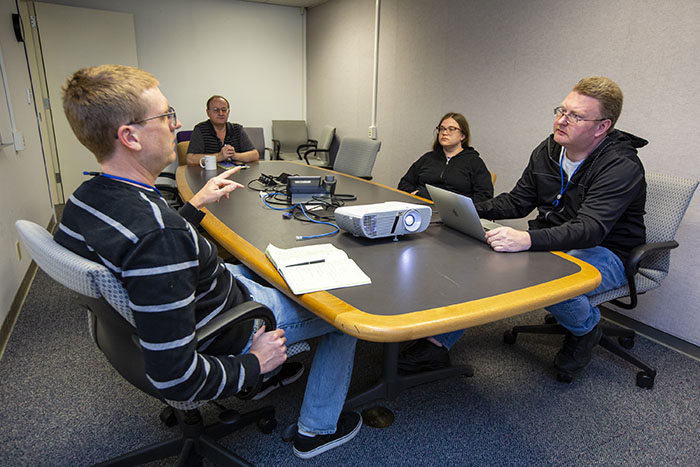Software Engineer Joe Spears Soars with Civil Air Patrol
April 15, 2020
 Joe Spears coaches team members Aryahi Nittur, Samantha Wang, Lena Amato, and Samuel Krechetov in a CyberPatriots national competition. The team members are Civil Air Patrol cadets. Credit: Jason Laurea
Joe Spears coaches team members Aryahi Nittur, Samantha Wang, Lena Amato, and Samuel Krechetov in a CyberPatriots national competition. The team members are Civil Air Patrol cadets. Credit: Jason Laurea On a Friday evening, four new IT professionals are in a frantic race, investigating a cascading barrage of security attacks on their network while maintaining critical services. They discover unauthorized user accounts, hacker tools installed in hidden directories, and disabled firewall and anti-virus protection. They have six hours to repair all the problems.
The team can’t overcome all the attacks — in fact, they only defeat about one-third of them — but they perform admirably. This isn’t the real world; it’s the CyberPatriot National Youth Cyber Defense Competition, part of the National Youth Cyber Education Program created by the Air Force Association. Its goal is to inspire K-12 students toward careers in cybersecurity or other science, technology, engineering, and mathematics disciplines (STEM) critical to national security.
The proud coach of this team is Joe Spears, a software developer for the National Ignition Facility’s Shot Setup Tool and Aerospace Education coordinator for the Civil Air Patrol (CAP), a civilian auxiliary of the U.S. Air Force, in the San Francisco Bay area. CAP leads CyberPatriots teams as part of its education initiatives, but teams are also led by schools, corporations, community groups, and many other organizations.
Lena Amato, an eighth grader from Tracy, California, is the team’s captain. The other members are Samuel Krechetov, Aryahi Nittur, and Samantha Wang.
“I’m so impressed with this team,” says Spears. “This is their first year competing. They don’t have a lot of experience, but they work together so well.”
Amato, an eighth grader, joined the CAP cadets, a leadership program for ages 12-18, because she wants to become a pilot like her father. “I joined CyberPatriots to get out of my comfort zone and learn new things,” she says. “I really like it. The competition is intense, but you work as a team.”
CyberPatriots is a year-round program, with camps in the summer, training and exhibition rounds in the fall, followed by two scored rounds of competition in October and November. At the state elimination round in December, teams qualify into three tiers: platinum, with a shot at qualifying for the national competition; gold; and silver.
On that January Friday, Amato’s team was competing in the gold level. They finished 24th out of more than 400 teams, and fourth in California.
Spears coaches two other CyberPatriots teams in Hayward and Concord and serves as a mentor to additional teams statewide. “My goal is to get kids excited about science and technology,” he says. “It’s a chance for me to share my passion for computer science.”
 Joe Spears, seen here explaining network vlans to Cyber Patriots team member Samuel Krechetov before the start of the competition, considers himself a “science evangelist” for Civil Air Patrol. Credit: Jason Laurea
Joe Spears, seen here explaining network vlans to Cyber Patriots team member Samuel Krechetov before the start of the competition, considers himself a “science evangelist” for Civil Air Patrol. Credit: Jason Laurea He describes his role of Aerospace Education coordinator as “science evangelism.” In addition to working with youth, his volunteer work includes teaching computer security and online safety to adults. In the past few months, he helped with Amazon’s “Hour of Code” program at the Oakland School Unified District and taught American Legion members how to avoid online scams, recognize phishing attacks, and stay safe online.
Discovering Computer Science
Spears probably could have benefited from CyberPatriots when he was the age of his team members — it took him some searching to find computer science. He joined CAP cadets as a teenager in Indiana for the leadership opportunities.
He started college at Indiana University, but didn’t really know what he wanted to do. “I needed a change, so I joined the Army,” he says.
He spent four years as a medical specialist with an infantry unit stationed in Germany. After leaving the Army he finished his undergraduate degree in computer science and wound up in Silicon Valley working in high tech. He eventually ran a small technology company and became a manager for Visa.
But Spears was not happy. Both roles separated him from the hands-on work that he loved. While considering his next career move, he earned his pilot’s license and rejoined CAP to continue flying.
“One of CAP’s primary responsibilities is emergency service missions assigned by the Air Force,” he explains. “These missions include participating in Air Force training exercises, searching for beacon alerts, and emergency response support. During natural disasters like fires and hurricanes, CAP takes aerial photography of affected areas to assist rescue efforts.”
In fiscal year 2018 CAP was credited with saving 158 lives. To date in 2020, they are credited with 51 lives saved.
Spears’ most impactful emergency service mission came in 2017, when wildfires ravaged Santa Rosa and other parts of California. CAP pilots flew aircraft outfitted with an Aeroptic Sensor Pod, a leading edge tactical aerial imagery system, and Garmin VIRB cameras attached to the wing of the aircraft. Images from those cameras provided rapid access to visual and multi-spectral data of the damage wrought by the wildfires, which helped FEMA assess damage as the fires began to be contained.
A New Start at LLNL
 Joe Spears, far right, discusses migration of the laser configuration from CMT to SST with team member Rich Beeler, Misha Shor, and Chantal Burgoyne. Credit: Jason Laurea
Joe Spears, far right, discusses migration of the laser configuration from CMT to SST with team member Rich Beeler, Misha Shor, and Chantal Burgoyne. Credit: Jason Laurea Through CAP, he met a few other LLNL employees and began hearing about job opportunities. “I had worked at briefly at LLNL much earlier in my career in cyber security right after I earned my master’s degree,” he says. “I was recruited away to a startup company. I remembered how great the culture was at the Lab. What really stuck with me after all those years was how we are all working hard to change the world. I knew that the time was right to come back.”
Spears re-joined LLNL about four years ago. What excited him most was the “greenfield” opportunity to develop code for the Shot Setup Tool.
“Greenfield” is new code that is still being designed and developed, versus running legacy code which is more about maintenance,” he says.
The teaming environment at LLNL is different from any place he’s worked previously. “I enjoy working with this team more than any other I’ve ever worked with. We can have good, solid debates in ways I’ve never done before.”
Spears hopes to run a CyberPatriots camp in the future. And he’s always looking for individuals willing to coach or mentor CyberPatriots teams. “It doesn’t have to be a big commitment,” he says. “Subject-matter experts teach a team a specific topic, either in person or virtually. It helps for them to get a diversity of instruction.”
—Patricia Koning
Follow us on Twitter: @lasers_llnl



